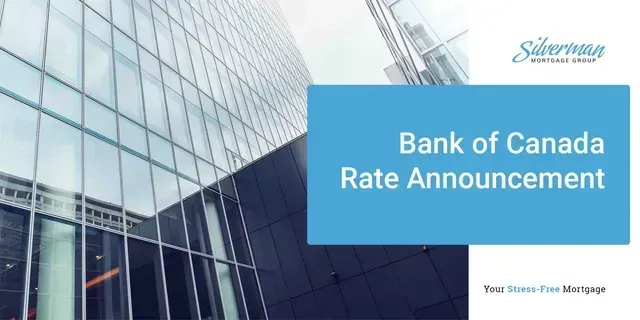Mortgage Articles

Bank of Canada holds policy rate at 2¾%. FOR IMMEDIATE RELEASE Media Relations Ottawa, Ontario April 16, 2025 The Bank of Canada today maintained its target for the overnight rate at 2.75%, with the Bank Rate at 3% and the deposit rate at 2.70%. The major shift in direction of US trade policy and the unpredictability of tariffs have increased uncertainty, diminished prospects for economic growth, and raised inflation expectations. Pervasive uncertainty makes it unusually challenging to project GDP growth and inflation in Canada and globally. Instead, the April Monetary Policy Report (MPR) presents two scenarios that explore different paths for US trade policy. In the first scenario, uncertainty is high but tariffs are limited in scope. Canadian growth weakens temporarily and inflation remains around the 2% target. In the second scenario, a protracted trade war causes Canada’s economy to fall into recession this year and inflation rises temporarily above 3% next year. Many other trade policy scenarios are possible. There is also an unusual degree of uncertainty about the economic outcomes within any scenario, since the magnitude and speed of the shift in US trade policy are unprecedented. Global economic growth was solid in late 2024 and inflation has been easing towards central bank targets. However, tariffs and uncertainty have weakened the outlook. In the United States, the economy is showing signs of slowing amid rising policy uncertainty and rapidly deteriorating sentiment, while inflation expectations have risen. In the euro area, growth has been modest in early 2025, with continued weakness in the manufacturing sector. China’s economy was strong at the end of 2024 but more recent data shows it slowing modestly. Financial markets have been roiled by serial tariff announcements, postponements and continued threats of escalation. This extreme market volatility is adding to uncertainty. Oil prices have declined substantially since January, mainly reflecting weaker prospects for global growth. Canada’s exchange rate has recently appreciated as a result of broad US dollar weakness. In Canada, the economy is slowing as tariff announcements and uncertainty pull down consumer and business confidence. Consumption, residential investment and business spending all look to have weakened in the first quarter. Trade tensions are also disrupting recovery in the labour market. Employment declined in March and businesses are reporting plans to slow their hiring. Wage growth continues to show signs of moderation. Inflation was 2.3% in March, lower than in February but still higher than 1.8% at the time of the January MPR. The higher inflation in the last couple of months reflects some rebound in goods price inflation and the end of the temporary suspension of the GST/HST. Starting in April, CPI inflation will be pulled down for one year by the removal of the consumer carbon tax. Lower global oil prices will also dampen inflation in the near term. However, we expect tariffs and supply chain disruptions to push up some prices. How much upward pressure this puts on inflation will depend on the evolution of tariffs and how quickly businesses pass on higher costs to consumers. Short-term inflation expectations have moved up, as businesses and consumers anticipate higher costs from trade conflict and supply disruptions. Longer term inflation expectations are little changed. Governing Council will continue to assess the timing and strength of both the downward pressures on inflation from a weaker economy and the upward pressures on inflation from higher costs. Our focus will be on ensuring that Canadians continue to have confidence in price stability through this period of global upheaval. This means we will support economic growth while ensuring that inflation remains well controlled. Governing Council will proceed carefully, with particular attention to the risks and uncertainties facing the Canadian economy. These include: the extent to which higher tariffs reduce demand for Canadian exports; how much this spills over into business investment, employment and household spending; how much and how quickly cost increases are passed on to consumer prices; and how inflation expectations evolve. Monetary policy cannot resolve trade uncertainty or offset the impacts of a trade war. What it can and must do is maintain price stability for Canadians. Information note The next scheduled date for announcing the overnight rate target is June 4, 2025. The Bank will publish its next MPR on July 30, 2025. Read the April 16th, 2025 Monetary Report

The best place to start the mortgage process is with a pre-approval. But once you’ve been pre-approved for a mortgage and you’ve been shopping with location in mind, what happens when you can’t find a suitable property? There's no doubt about it; finding the perfect property within your price range is a difficult task, especially for first-time homebuyers. So, before buyer’s fatigue sets in, maybe you should consider adding the cost of renovations into your purchase. Buying a property and including the cost of renovations into the mortgage is available through a program called purchase plus improvements. When purchasing a home, you can add the cost of home upgrades into your mortgage, making it a great option if you can’t find something move-in ready and aren’t afraid to do a little work! But while this sounds simple enough, in all honestly, it’s quite the process. There are some pretty strict rules to follow, but nothing that you can’t handle with the guidance of an independent mortgage professional. Here’s a quick overview of the process. Firstly, you must provide quotes to the lender ahead of time for the work you would like to complete. It’s good to note that the renovations will have to increase the value of the property accordingly. From there, the lender doesn’t give you the money to do the upgrades; you have to come up with that yourself. However, once the work has been completed and verified by an appraiser, the lender will reimburse you and include the money in your mortgage. This program isn’t for everyone. Buying a home is a stressful endeavour in and of itself. The added stress of having to undertake renovations right away might not be a good idea. But then again, if you have the financial wherewithal to handle the cost of renovations and like the idea of making it yours from the start, then this might be just the option you’ve been looking for! Please connect directly; it would be a pleasure to walk through the exact process and outline what securing a purchase plus improvements would look like for you!

Credit. The ability of a customer to obtain goods or services before payment, based on the trust that you will make payments in the future. When you borrow money to buy a property, you’ll be required to prove that you have a good history of managing your credit. That is, making good on all your payments. But what exactly is a “good history of managing credit”? What are lenders looking at when they assess your credit report? If you’re new to managing your credit, an easy way to remember the minimum credit requirements for mortgage financing is the 2/2/2 rule. Two active trade lines established over a minimum period of two years, with a minimum limit of two thousand dollars, is what lenders are looking for. A trade line could be a credit card, an instalment loan, a car loan, or a line of credit; basically, anytime a lender extends credit to you. Your repayment history is kept on your credit report and generates a credit score. For a tradeline to be considered active, you must have used it for at least one month and then once every three months. To build a good credit history, both of your tradelines need to be used for at least two years. This history gives the lender confidence that you’ve established good credit habits over a decent length of time. Two thousand dollars is the bare minimum limit required on your trade lines. So if you have a credit card with a $1000 limit and a line of credit with a $2500 limit, you would be okay as your limit would be $3500. If you’re managing your credit well, chances are you will be offered a limit increase. It’s a good idea to take it. Mortgage Lenders want to know that you can handle borrowing money. Now, don’t confuse the limit with the balance. You don’t have to carry a balance on your trade lines for them to be considered active. To build credit, it’s best to use your tradelines but pay them off in full every month in the case of credit cards and make all your loan payments on time. A great way to use your credit is to pay your bills via direct withdrawal from your credit card, then set up a regular transfer from your bank account to pay off the credit card in full every month. Automation becomes your best friend. Just make sure you keep on top of your banking to ensure everything works as it should. Now, you might be thinking, what about my credit score, isn’t that important when talking about building a credit profile to secure a mortgage? Well, your credit score is important, but if you have two tradelines, reporting for two years, with a minimum limit of two thousand dollars, without missing any payments, your credit score will take care of itself, and you should have no worries. With that said, it never hurts to take a look at your credit every once and a while to ensure no errors are reported on your credit bureau. So, if you’re thinking about buying a property in the next couple of years and want to make sure that you have good enough credit to qualify, let’s talk. Connect anytime; it would be a pleasure to work with you and help you to understand better how your credit impacts mortgage qualification.

If you have a variable rate mortgage and recent economic news has you thinking about locking into a fixed rate, here’s what you can expect will happen. You can expect to pay a higher interest rate over the remainder of your term, while you could end up paying a significantly higher mortgage penalty should you need to break your mortgage before the end of your term. Now, each lender has a slightly different way that they handle the process of switching from a variable rate to a fixed rate. Still, it’s safe to say that regardless of which lender you’re with, you’ll end up paying more money in interest and potentially way more money down the line in mortgage penalties should you have to break your mortgage. Interest rates on fixed rate mortgages Fixed rate mortgages come with a higher interest rate than variable rate mortgages. If you’re a variable rate mortgage holder, this is one of the reasons you went variable in the first place; to secure the lower rate. The perception is that fixed rates are somewhat “safe” while variable rates are “uncertain.” And while it’s true that because the variable rate is tied to prime, it can increase (or decrease) within your term, there are controls in place to ensure that rates don’t take a roller coaster ride. The Bank of Canada has eight prescheduled rate announcements per year, where they rarely move more than 0.25% per announcement, making it impossible for your variable rate to double overnight. Penalties on fixed rate mortgages Each lender has a different way of calculating the cost to break a mortgage. However, generally speaking, breaking a variable rate mortgage will cost roughly three months of interest or approximately 0.5% of the total mortgage balance. While breaking a fixed rate mortgage could cost upwards of 4% of the total mortgage balance should you need to break it early and you’re required to pay an interest rate differential penalty. For example, on a $500k mortgage balance, the cost to break your variable rate would be roughly $2500, while the cost to break your fixed rate mortgage could be as high as $20,000, eight times more depending on the lender and how they calculate their interest rate differential penalty. The flexibility of a variable rate mortgage vs the cost of breaking a fixed rate mortgage is likely another reason you went with a variable rate in the first place. Breaking your mortgage contract Did you know that almost 60% of Canadians will break their current mortgage at an average of 38 months? And while you might have the best intention of staying with your existing mortgage for the remainder of your term, sometimes life happens, you need to make a change. Here’s is a list of potential reasons you might need to break your mortgage before the end of the term. Certainly worth reviewing before committing to a fixed rate mortgage. Sale of your property because of a job relocation. Purchase of a new home. Access equity from your home. Refinance your home to pay off consumer debt. Refinance your home to fund a new business. Because you got married, you combine assets and want to live together in a new property. Because you got divorced, you need to split up your assets and access the equity in your property Because you or someone close to you got sick Because you lost your job or because you got a new one You want to remove someone from the title. You want to pay off your mortgage before the maturity date. Essentially, locking your variable rate mortgage into a fixed rate is choosing to voluntarily pay more interest to the lender while giving up some of the flexibility should you need to break your mortgage. If you’d like to discuss this in greater detail, please connect anytime. It would be a pleasure to walk you through all your mortgage options and provide you with professional mortgage advice.

In recent years, housing affordability has become a significant concern for many Canadians, particularly for first-time homebuyers facing soaring prices and strict mortgage qualification criteria. To address these challenges, the Canadian government has introduced several housing affordability measures. In this blog post, we'll examine these measures and their potential implications for homebuyers. Increased Home Buyer's Plan (HBP) Withdrawal Limit Effective April 16, the Home Buyer's Plan (HBP) withdrawal limit will be raised from $35,000 to $60,000. The HBP allows first-time homebuyers to withdraw funds from their Registered Retirement Savings Plan (RRSP) to use towards a down payment on a home. By increasing the withdrawal limit, the government aims to provide young Canadians with more flexibility in saving for their down payments, recognizing the growing challenges of entering the housing market. Extended Repayment Period for HBP Withdrawals In addition to increasing the withdrawal limit, the government has extended the repayment period for HBP withdrawals. Individuals who made withdrawals between January 1, 2022, and December 31, 2025, will now have five years instead of two to begin repayment. This extension provides borrowers with more time to manage their finances and repay the withdrawn amounts, alleviating some of the immediate financial pressures associated with using RRSP funds for a down payment. 30-Year Mortgage Amortizations for Newly Built Homes Starting August 1, 2024, first-time homebuyers purchasing newly built homes will be eligible for 30-year mortgage amortizations. This change extends the maximum mortgage repayment period from 25 years to 30 years, resulting in lower monthly mortgage payments. By offering longer amortization periods, the government aims to increase affordability and assist homebuyers in managing their housing expenses more effectively. Changes to the Canadian Mortgage Charter The government has also introduced changes to the Canadian Mortgage Charter to provide relief to homeowners facing financial challenges. These changes include early mortgage renewal notifications and permanent amortization relief for eligible homeowners. By implementing these measures, the government seeks to support homeowners in maintaining affordable mortgage payments and mitigating the risk of default during times of financial hardship. The recent housing affordability measures announced by the Canadian government are aimed at addressing the challenges faced by homebuyers in today's market. These measures include increasing withdrawal limits, extending repayment periods, and offering longer mortgage amortizations. The goal is to make homeownership more accessible and affordable for Canadians across the country. As these measures come into effect, it's crucial for homebuyers to stay informed about the changes and their implications. Consulting with a mortgage professional can help individuals explore their options and make informed decisions about their housing finances. If you're interested in learning more about these changes and how they may affect you, please don't hesitate to connect with us. We're here to walk you through the process and help you consider all your options and find the one that makes the most sense for you.

Bank of Canada reduces policy rate by 25 basis points to 2¾% FOR IMMEDIATE RELEASE Media Relations Ottawa, Ontario March 12, 2025 The Bank of Canada today reduced its target for the overnight rate to 2.75%, with the Bank Rate at 3% and the deposit rate at 2.70%. The Canadian economy entered 2025 in a solid position, with inflation close to the 2% target and robust GDP growth. However, heightened trade tensions and tariffs imposed by the United States will likely slow the pace of economic activity and increase inflationary pressures in Canada. The economic outlook continues to be subject to more-than-usual uncertainty because of the rapidly evolving policy landscape. After a period of solid growth, the US economy looks to have slowed in recent months. US inflation remains slightly above target. Economic growth in the euro zone was modest in late 2024. China’s economy has posted strong gains, supported by government policies. Equity prices have fallen and bond yields have eased on market expectations of weaker North American growth. Oil prices have been volatile and are trading below the assumptions in the Bank’s January Monetary Policy Report (MPR). The Canadian dollar is broadly unchanged against the US dollar but weaker against other currencies. Canada’s economy grew by 2.6% in the fourth quarter of 2024 following upwardly revised growth of 2.2% in the third quarter. This growth path is stronger than was expected at the time of the January MPR. Past cuts to interest rates have boosted economic activity, particularly consumption and housing. However, economic growth in the first quarter of 2025 will likely slow as the intensifying trade conflict weighs on sentiment and activity. Recent surveys suggest a sharp drop in consumer confidence and a slowdown in business spending as companies postpone or cancel investments. The negative impact of slowing domestic demand has been partially offset by a surge in exports in advance of tariffs being imposed. Employment growth strengthened in November through January and the unemployment rate declined to 6.6%. In February, job growth stalled. While past interest rate cuts have boosted demand for labour in recent months, there are warning signs that heightened trade tensions could disrupt the recovery in the jobs market. Meanwhile, wage growth has shown signs of moderation. Inflation remains close to the 2% target. The temporary suspension of the GST/HST lowered some consumer prices, but January’s CPI was slightly firmer than expected at 1.9%. Inflation is expected to increase to about 2½% in March with the end of the tax break. The Bank’s preferred measures of core inflation remain above 2%, mainly because of the persistence of shelter price inflation. Short-term inflation expectations have risen in light of fears about the impact of tariffs on prices. While economic growth has come in stronger than expected, the pervasive uncertainty created by continuously changing US tariff threats is restraining consumers’ spending intentions and businesses’ plans to hire and invest. Against this background, and with inflation close to the 2% target, Governing Council decided to reduce the policy rate by a further 25 basis points. Monetary policy cannot offset the impacts of a trade war. What it can and must do is ensure that higher prices do not lead to ongoing inflation. Governing Council will be carefully assessing the timing and strength of both the downward pressures on inflation from a weaker economy and the upward pressures on inflation from higher costs. The Council will also be closely monitoring inflation expectations. The Bank is committed to maintaining price stability for Canadians. Information note The next scheduled date for announcing the overnight rate target is April 16, 2025. The Bank will publish its next full outlook for the economy and inflation, including risks to the projection, in the MPR at the same time.

Dreaming of owning your first home? A First Home Savings Account (FHSA) could be your key to turning that dream into a reality. Let's dive into what an FHSA is, how it works, and why it's a smart investment for first-time homebuyers. What is an FHSA? An FHSA is a registered plan designed to help you save for your first home taxfree. If you're at least 18 years old, have a Social Insurance Number (SIN), and have not owned a home where you lived for the past four calendar years, you may be eligible to open an FHSA. Reasons to Invest in an FHSA: Save up to $40,000 for your first home. Contribute tax-free for up to 15 years. Carry over unused contribution room to the next year, up to a maximum of $8,000. Potentially reduce your tax bill and carry forward undeducted contributions indefinitely. Pay no taxes on investment earnings. Complements the Home Buyers’ Plan (HBP). How Does an FHSA Work? Open Your FHSA: Start investing tax-free by opening your FHSA. Contribute Often: Make tax-deductible contributions of up to $8,000 annually to help your money grow faster. Withdraw for Your Home: Make a tax-free withdrawal at any time to purchase your first home. Benefits of an FHSA: Tax-Deductible Contributions: Contribute up to $8,000 annually, reducing your taxable income. Tax-Free Earnings: Enjoy tax-free growth on your investments within the FHSA. No Taxes on Withdrawals: Pay $0 in taxes on withdrawals used to buy a qualifying home. Numbers to Know: $8,000: Annual tax-deductible FHSA contribution limit. $40,000: Lifetime FHSA contribution limit. $0: Taxes on FHSA earnings when used for a qualifying home purchase. In Conclusion A First Home Savings Account (FHSA) is a powerful tool for first-time homebuyers, offering tax benefits and a structured approach to saving for homeownership. By taking advantage of an FHSA, you can accelerate your journey towards owning your first home and make your dream a reality sooner than you think.

Refinancing your mortgage can be a smart financial move, but how do you know if it’s the right time? Whether you’re looking to lower your monthly payments, access home equity, or consolidate debt, refinancing can offer valuable benefits. Here are five key signs that it might be the right time to refinance your mortgage in Canada. 1. Interest Rates Have Dropped One of the most common reasons Canadians refinance is to secure a lower interest rate. Even a small decrease in your mortgage rate can lead to significant savings over time. If rates have dropped since you took out your mortgage, refinancing could help you reduce your monthly payments and save thousands in interest. ✅ Tip: Check with your mortgage broker to compare your current rate with today’s market rates. 2. Your Financial Situation Has Improved If your credit score has increased or your income has stabilized since you first got your mortgage, you might qualify for better loan terms. Lenders offer lower rates and better conditions to borrowers with strong financial profiles. ✅ Tip: If you’ve paid off debts, improved your credit score, or increased your savings, refinancing could work in your favour. 3. You Want to Consolidate High-Interest Debt Carrying high-interest debt from credit cards, personal loans, or lines of credit? Refinancing can help consolidate those debts into your mortgage at a much lower interest rate. This can make monthly payments more manageable and reduce the overall cost of borrowing. ✅ Tip: Make sure the savings from refinancing outweigh any prepayment penalties or fees. 4. You Need to Free Up Cash for a Major Expense Many Canadians refinance to access their home’s equity for renovations, education costs, or major life expenses. With home values rising in many areas, a refinance could help you tap into that value while still keeping manageable payments. ✅ Tip: Consider a home equity line of credit (HELOC) if you need flexible access to funds. 5. Your Mortgage Term is Ending, and You Want Better Terms If your mortgage is up for renewal, it’s the perfect time to explore refinancing options. Instead of simply accepting your lender’s renewal offer, compare rates and terms to see if you can get a better deal elsewhere. ✅ Tip: A mortgage broker can help you shop around and negotiate better terms on your behalf. Is Refinancing Right for You? Refinancing isn’t always the best move—there can be penalties for breaking your current mortgage, and not all savings are worth the switch. However, if you relate to any of the five signs above, it’s worth discussing your options with a mortgage professional. Thinking about refinancing? Let’s chat and find the best option for you!

A no-frills service or product is where non-essential features have been removed from the product or service to keep the price as low as possible. And while keeping costs low at the expense of non-essential features might be okay when choosing something like which grocery store to shop at, which economy car to purchase, or which budget hotel to spend the night, it’s not a good idea when considering which lender to secure mortgage financing. Here’s why. When securing mortgage financing, your goal should be to pay the least amount of money over the term. Your plan should include having provisions for unexpected life changes. Unlike the inconvenience of shopping at a store that doesn’t provide free bags, or driving a car without power windows, or staying at a hotel without any amenities, the so-called “frills” that are stripped away to provide you with the lowest rate mortgage are the very things that could significantly impact your overall cost of borrowing. Depending on the lender, a “no-frills” mortgage rate might be up to 0.20% lower than a fully-featured mortgage. And while this could potentially save you a few hundreds of dollars over a 5-year term, please understand that it could also potentially cost you thousands (if not tens of thousands) of dollars should you need to break your mortgage early. So if you’re considering a “no-frills” mortgage, here are a few of the drawbacks to think through: You'll pay a significantly higher penalty if you need to break your mortgage. You'll have limited pre-payment privileges. Potential limitations if you want to port your mortgage to a different property. You might be limited in your ability to refinance your mortgage (without incurring a considerable penalty). Simply put, a “no-frills” mortgage is an entirely restrictive mortgage that leaves you without any flexibility. There are many reasons you might need to keep your options open. You might need to break your term because of a job loss or marital breakdown, or maybe you decide to take a new job across the country, or you need to buy a property to accommodate your growing family. Life is unpredictable; flexibility matters. So why do banks offer a no-frills mortgage anyway? Well, when you deal with a single bank or financial institution, it’s the banker’s job to make as much money from you as possible, even if that means locking you into a very restrictive mortgage product by offering a rock bottom rate. Banks know that 2 out of 3 people break their mortgage within three years (33 months). However, when you seek the expert advice of an independent mortgage professional, you can expect to see mortgage options from several institutions showcasing mortgage products best suited for your needs. We have your best interest in mind and will help you through the entire process. A mortgage is so much more than just the lowest rate. If you have any questions about this, or if you’d like to discuss anything else mortgage-related, please get in touch. Working with you would be a pleasure!
Ready to get started?
We believe the key to providing a stress-free mortgage experience relies on our ability to communicate effectively. No one wants to be left wondering about the next step.
This is why we take a team approach.
We’re a small group of mortgage professionals who spend just as much time making sure our clients have a great experience as we do closing mortgages.



